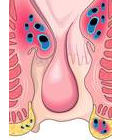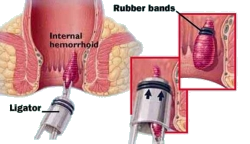Prolapsed Hemorrhoid Treatment
Just as you were beginning to wrap your thoughts around and come to terms with the fact that you have hemorrhoids here comes the realization that your hemorrhoids have prolapsed. Say what? Prolapsed hemorrhoids is simply a fancy way of referring to internal hemorrhoids that have become so enlarged that they have no choice but to drop or protrude outside of your rectal canal. Quite different from external hemorrhoids which have their origins from the outside the prolapsed hemorrhoids start from the inside and protrude out. In the following paragraphs we will explore some options for treatment of prolapsing internal hemorrhoid.
Causes and Prevention of Prolapsed Hemorrhoids
 Anything that leads to the strain of the vessels in the rectal area can result in the formation of hemorrhoids. Strain can be brought on by constipation or diarrhea, strenuous activities, pregnancy and even old age. Another factor that must be considered as a probable cause of hemorrhoid is obesity. An obese person has extra fat that can add extra pressure on the rectal veins, reduce muscle tone and result in bad posture which will put stress on the rectal veins.
Anything that leads to the strain of the vessels in the rectal area can result in the formation of hemorrhoids. Strain can be brought on by constipation or diarrhea, strenuous activities, pregnancy and even old age. Another factor that must be considered as a probable cause of hemorrhoid is obesity. An obese person has extra fat that can add extra pressure on the rectal veins, reduce muscle tone and result in bad posture which will put stress on the rectal veins.
Hemorrhoids in general including prolapsing internal hemorrhoids can be prevented by increasing your daily fluid intake which will maintain proper and regular bowel movement. Include vegetables, fruits and lots of whole grain, which are all good sources of fiber, in your diet in other to keep the stools soft and free flowing. Develop a habit of taking walks daily since even moderate exercise will go a long way in increasing muscle tone and healthy veins that are not easily strained.
Symptoms of Prolapsed Hemorrhoids
You can identify and easily distinguish your prolapsed hemorrhoids from external hemorrhoids by the fact that the prolapsed hemorrhoid will protrude from the inside of the rectum, is usually wet and covered with mucus from the rectum and can cause bleeding with the passage of stools. Although prolapsed hemorrhoids are usually painless there are cases where the external mass of tissue can be so inflamed that they cause severe pain.
Degrees of Prolapsed Hemorrhoids
To further complicate things, or perhaps just to classify prolapsed hemorrhoids in the medical field, there are three degrees of prolapsed hemorrhoids. They are grades II, III and IV. If your hemorrhoids have reached a prolapsed stage they are classified as either grade III or grade IV. In the third stage the tissue can be placed back manually within the anal canal but in the fourth stage it cannot be reinserted and will continuously hang outside the anus. The second degree is not as severe and in this case is rarely observed since it will only emerge from the rectum with the passage of stools but will retract almost immediately afterward.
Prolapsed Hemorrhoid Treatment
The treatment of prolapsing internal hemorrhoid all depends on their severity. Warm water baths can help the discomfort and pain associated with inflammation and ointments and creams can relieve itching and swelling.
In more severe cases (grade IV prolapsed hemorrhoids) a Hemorroidectomy might be recommended which involves the surgical removal of the hemorrhoid. This procedure requires some time for recovery and there will be excessive pain following the procedure.
A Stapled Hemorrhoidectomy is another option which works by reducing the flow of blood to the inflamed tissue and so the hemorrhoid is starved from a supply of blood. Since it is much less painful than Hemorrhoidectomy and requires much less time for recovery it is the prolapsed hemorrhoid treatment most preferred by both doctors and patients.
Categories: Hemorrhoids information, Hemorrhoids Treatment Tags: internal hemorrhoids, prolapsed hemorrhoids
Are Hemorrhoids Dangerous?
Even the calmest person can plunge into a state of frenzy at the sight of blood in the rectum. It is never a pleasant experience to see blood coming from any part of the body but when it appears in the anus or stools it can be cause for alarm. More often than not if you do experience bleeding in this region it can be attributed to hemorrhoids. The next question would of course be, are hemorrhoids dangerous? We will explore the answers to this question in this article.
 Hemorrhoids form when the clusters of veins found in the rectum and anus become swollen and distended. Hemorrhoids are usually associated with chronic constipation and anything that causes strain on the bowels such as the pressure caused by a growing baby during pregnancy. Rectal muscles that become weakened with age can lead to bulging or prolapsed hemorrhoids.
Hemorrhoids form when the clusters of veins found in the rectum and anus become swollen and distended. Hemorrhoids are usually associated with chronic constipation and anything that causes strain on the bowels such as the pressure caused by a growing baby during pregnancy. Rectal muscles that become weakened with age can lead to bulging or prolapsed hemorrhoids.
The good news is that hemorrhoids are rarely dangerous. In fact most cases can be treated successfully at home with the help of natural hemorrhoid treatments, sitz baths, over the counter creams to take care of the itching and by the inclusion of the recommended daily fiber intake in the diet for a more long term solution. The dangers of hemorrhoids mainly involve serious discomfort, pain and risk of inflammation.
While the appearance of blood can be alarming it is most likely a result of the tearing of a hemorrhoid vein wall during a bowel movement. The increased pressure within the veins brought on by adding strain during a bowel movement can cause it to burst and this is the reason for the blood you see. Now, that said you should take note that sometimes, just sometimes, bleeding from the rectum can be a sign that something more serious is going on down there.
Some diseases such as those related to anorectal conditions which result in the formation of fissures, abscesses and fistulas can all exhibit symptoms that are similar to hemorrhoids. Inflammatory bowel diseases such as Ulcerative Colitis and Crohn’s disease and sexually transmitted diseases such as anal warts, herpes, syphilis, Chlamydia and gonorrhea also display symptoms of anal bleeding, itching and pain which can also be attributed to hemorrhoids. Finally polyps and cancer also show symptoms which can be mistakenly diagnosed as hemorrhoids by the inexperienced. These symptoms usually show up in the advanced stages of cancer and will be detected by a doctor with the help of a colonoscopy.
The mention of these related diseases is not meant to cause further alarm. They are however meant to communicate the seriousness with which you should view symptoms of prolonged bleeding and pain in the rectum. You should seek medical attention from a doctor who treats hemorrhoids to receive a correct diagnosis if you are not one hundred certain that you are suffering from hemorrhoids and to identify any possible dangers of hemorrhoids based on their type and age. Untreated hemorrhoids have more risks associated with them as blood clots entering blood circulatory system and then dangers associated with surgery if they are allowed to develop into latter stages.
Ahemorrhoids dangerousre Hemorrhoids Dangerous?
If you are certain that hemorrhoids are the cause of your bleeding, discomfort and pain the question still remains, are hemorrhoids dangerous? They are not and usually with proper treatment using creams, natural remedies and some important lifestyle changes that involve diet and exercise you will be able to get rid of hemorrhoids. In very cases surgery might be recommended as a last resort by doctors who treat hemorrhoids.
Categories: Hemorrhoids information Tags: hemorrhoids doctor, hemorrhoids symptoms, hemorrhoids treatment
How Long Do Hemorrhoids Last?
Most of us have it but very few of us dare to talk about it in public or even in private for that matter. It’s our dirty little secret, a pain in the butt, something that we just want to keep under wraps, that little something is called hemorrhoids. People who have suffered with hemorrhoids know firsthand that it’s no walk in the park and their first concern after they’ve diagnosed themselves (many are too embarrassed to go to the doctor’s office) is how to get rid of hemorrhoids and they most often ask how long do hemorrhoids last?
Understanding what causes hemorrhoids goes a long way in the proper care and treatment of hemorrhoids and making sure that they go away for good. In a nutshell anything that causes strain south of the border can lead to the swelling and inflammation of veins in the anal canal. Therefore strained bowel movement, constipation and pressure caused by an expanding fetus during pregnancy can all lead to the pain and symptoms of hemorrhoids that we all love to hate.
That’s all well and good you might be saying but the question still remains how long do hemorrhoids last? Apart from the causes of hemorrhoids the length of time that hemorrhoids take to heal is also based on the type of hemorrhoids. Let’s look at healing times based on the type of hemorrhoids.
How Long Do External Hemorrhoids Last?
External hemorrhoids are swollen veins that have the appearance of bumps in the rim of the anus. The exposed area is easily irritated by friction and other symptoms such as bleeding, pain, itching are commonly experienced by patients.
 Fortunately the treatment of external hemorrhoids is very straight forward and as long as your symptoms are not severe your hemorrhoids can go away in as little as 2-4 days. Natural remedies and over the counter treatments will usually take care of burning, pain, itching and swelling for relief in 3-4 days.
Fortunately the treatment of external hemorrhoids is very straight forward and as long as your symptoms are not severe your hemorrhoids can go away in as little as 2-4 days. Natural remedies and over the counter treatments will usually take care of burning, pain, itching and swelling for relief in 3-4 days.
If you fail to get any sort of relief with these treatment options you may well have to suck it up and go see your doctor who after a thorough inspection of the area might recommend any one of the following treatments.
- Ligation treatment which involves the use of specially made rubber bands used to cut off the blood supply to the vein which will force the swelling to recede and eventually disappear altogether. Patients will see visible results in as little as one week.
- Infrared coagulation treatment is also effective but can take up to one month before the results are clearly visible.
- If you’re diagnosed with a more severe case of hemorrhoids then your doctor could advise a hemorrhoidectomy which is a surgical procedure that can take several weeks for recovery.
How Long Do Internal Hemorrhoids Last?
With internal hemorrhoids the swollen veins start within the anal canal and sufferers rarely know they have a problem until the veins become engorged and push out of the rectum with the passing of stools. As with external hemorrhoids the length of time for healing is all based on the severity of the hemorrhoids but usually will go away in a few days (3-4 days).
Treatment options are similar to those mentioned for external hemorrhoids but consider the following additional bits of advice if you want your painfully embarrassing case of hemorrhoids to go away and stay away for good.
The number one rule of thumb for treating hemorrhoids is to go when you have to go, it is just not something that you should out off for later. Get lots of fiber and if that sounds like a dirty word to you well I should remind you of your little problem so a little bit of fiber is a small sacrifice to make and besides nowadays they are a number of great tasting products that come with lots of fiber. Sooth the area, reduce swelling and itching with the help of Tucks pads and Sitz baths. Finally drink lots of water, exercise and try to be consistent with bowel movements.
So you see talking about hemorrhoids is not so bad after all and with any luck this question of how long do hemorrhoids last will soon be a distant memory.
